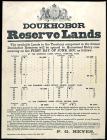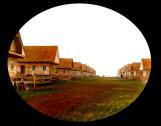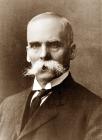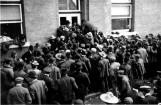6
To his brethren, Peter talked a lot, where he had been, what his life had been like. He spoke of Jesus, how he had suffered, how he had been crucified. Then he said he wanted to visit all the villages. "Who among you can sing? I want only six people, three brothers and three sisters ". He stated that he wanted to take singers with him when he visited the villages. These were chosen and among the sisters was a young woman of 18 years by the name of Anastasia Gulobova.Anastasia Gulobova was the niece of one of the village elders and at the time of their meeting, eighteen years of age. She remained his constant companion and devoted servant for the next twenty-two years until his death, and for all intents and purposes, his wife, although there never was an official ceremony. Anastasia traveled with Peter in Canada and the US and through the years cultivated a loyal following of her own as the wife of Peter 'Lordly' as he had been dubbed by his faithful.
7
Immediately upon inspection of the villages and conversations with a few of his close and more devoted allies, Verigin identified the problems which needed to be addressed. While he was impressed that the communal lifestyle that he instructed was on the most part, adhered to, he was disappointed that over two thousand of the Doukhobors had by this time chosen an 'Independent' way of life - neither contributing to, nor dependent on the Community but by the spring of the following year he had convinced all but a few to rejoin the community.8
His other disappointment was the discontent and fanatic actions by the zealots and although he pacified them in the short term, in the next few years they would become both a problem and an embarrassment to Peter V. Verigin. Regarding the land registration, Verigin had an idea for this too.10
In a short time after his arrival, Verigin at the helm, the Doukhobor Trading Company was started. The villages in turn became more organized and in the minds of most, a trust was there for their beloved leader that had been missing for so many years.A committee was formed and soon they started registering homesteads in the name of the community as opposed to individual ownership. (In this method, by 1905 a total of over 2700 homesteads had been registered thus satisfying at least temporarily, the requirements of the Dominion and those in the community who felt that man should not own individual lands).
11
This didn't solve the entire issue but at least bought them some time (3 years, by law). Verigin learned that by owning land individually, the next process would be to become naturalized and that involved taking an oath of allegiance - this caveat was the most severe of all because to the Doukhobors, their understanding was that they would never have to bear arms. Yet to sign an oath of allegiance to the British monarchy (just another Tsar as far as the Doukhobors were concerned) was to in fact agree to bear arms should the king request it. This was not what they agreed to when they agreed to in coming to Canada and these people, after centuries of distrust of their government in mother Russia, saw the Dominion government as nothing different than the Tsar's government.For a time though, the community progressed. Capital was raised by hiring out more men than ever before to the building of the railway. (Those who stayed behind tended to the farms). Livestock for dairy, chickens for eggs, oxen and equipment was purchased; a modernization plan was in effect to buy farming equipment that would be the envy of any farmer. In 1903 Verigin purchased an additional 14 square miles outside the land reserves where the village of Verigin would be located (and head office of the Christian Community of Universal Brotherhood or CCUB) and where the railway would soon pass. Three other villages were built as well on these newly acquired lands. Within the next few years a modern brick factory was built, as was a large flour mill, a cheese factory and other enterprises. Though lumber wasn't nearly as plentiful as it was in BC for example, community sawmills were also built.
12
But all was not well in the commune, for just six months after his arrival, a few of the discontented began to up rise. No longer the Sons of God, but now 'Svobodniki' or 'Freedomites' began a practice that would last for decades to come. 52 men, women and children shed their clothing, uninhibited and free as 'Adam and Eve', marched through Doukhobor villages until they were stopped and whipped with willow twigs by their own brethren, disgusted by their behaviour. The women and children were held back; the 29 men then continued on to Yorkton where they were arrested and jailed for 3 months for indecent exposure.These zealots were impressed by attention they received and after their incarceration, ten of these fanatics set fire to a piece of Community farm equipment. These fanatics called themselves 'purists' and in an effort to attack science and materialism, they also trampled down some wheat. Verigin had no compassion for these uprisings and offered no sympathy when he pressed charges of arson. Six of the men were jailed and two were later certified to be insane and were later sent to an asylum, but this would not mean the end of the Sons of Freedom.
14
More trouble awaited Verigin and his followers as the territories were merged into the province of Saskatchewan. A major shift also occurred in federal policy under Frank Oliver who became Minister of the Interior in 1905. The previous leniency of Clifford Sifton was forgotten and Oliver, who was openly hostile to both communalism and all Slavic sects, was determined to make the Doukhobors conform to the new government's regulations.All Doukhobors were now required to register individually for their homesteads and to fulfill all conditions. While most were now reluctantly willing to accept the part of the individual land registration condition, because of their religious beliefs (and of Verigin's past insistence never to swear an oath), they refused to the swearing of an oath of allegiance which was the final step to acquire title. In their opinion, swearing an oath was bad in enough - but to swear an oath of allegiance to the monarchy (which in their minds left them open for conscription), was simply unacceptable. They argued that the swearing of oaths was never part of the original agreement made in 1898, but their arguments fell on deaf ears. The non-negotiable ultimatum the government imposed was "sign the oath, or lose the land".
15
On some issues it seemed that Verigin's opinion was iron-clad. By Doukhobor tradition, people were allowed to speak in a sobranie (meeting) and the leader would then voice his or her opinion, much of the time making a decision final. It is reported that on this issue though, Verigin gave the 7500+ Doukhobors a choice to either stay in Saskatchewan and sign the oath (thus abandon their Doukhobor belief and Doukhobor faith) or follow him to a new land, a warmer climate, in the Interior of British Columbia.16
This new land, if purchased privately, would not entail the same 'strings' attached to the land the Dominion offered them, and under the assurance of the Province of BC that they wouldn't interfere with the community if they owned their own lands, Verigin encouraged the BC choice.18
In June 1907, over 256,800 acres - most which were choice, cleared and cultivated, hard-worked lands, were confiscated by the Dominion of Canada. This led to a mass 'land rush' whereby these prosperous lands were now simply given away to the public. (See the next screen's poster of 1907).Massive line-ups ensued as result of the land grab and opportunists gathered to take advantage of the pacifist Doukhobors' loss. Some of these opportunists were even other Doukhobors who chose not to follow their brethren and who had conceded to both the land registration and oath of allegiance.
19
Dominion Government poster, giving away confiscated Sakatchewan lands1 June 1907
Saskatchewan, Canada



